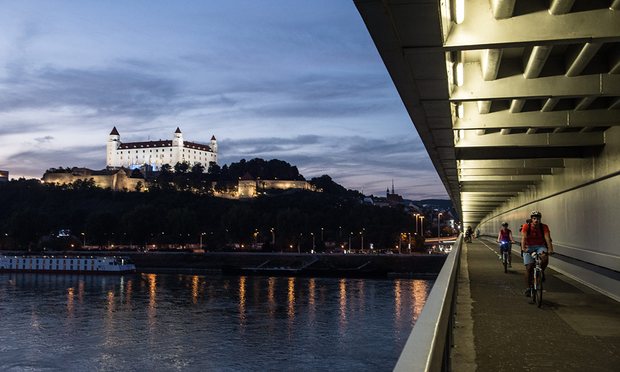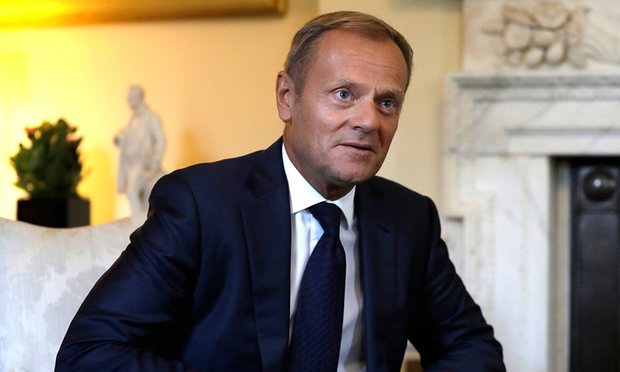EU leaders seek unity at Bratislava summit amid east-west migration split
On Thursday Tusk called on EU leaders to take a “brutally honest” look at the bloc’s problems, declaring: “We must not let this crisis go to waste.”
 |
| The EU summit will take place at Bratislava castle, a citadel that towers over the Danube. Slovakia is part of the Visegrád group. Photograph: Filip Singer/EPA |
“We haven’t come to Bratislava to comfort each other or even worse to deny the real challenges we face in this particular moment in the history of our community after the vote in the UK,” said Tusk, who will chair the summit.
“We can’t start our discussion ... with this kind of blissful conviction that nothing is wrong, that everything was and is OK,” he added. “We have to assure ... our citizens that we have learned the lesson from Brexit and we are able to bring back stability and a sense of security and effective protection.”
Tusk hopes to focus on areas that the 27 leaders can agree on: border security, counter-terrorism and moves to “to bring back control of globalisation”. Officials are playing down expectations of results from the meeting at Bratislava castle, in the capital of Slovakia, one of the four Visegrád countries along with Poland, Hungary and the Czech Republic.
Officials close to Tusk hope for small but symbolic breakthroughs, most notably an agreement to send an extra 200 border guards and 50 vehicles to the EU’s external frontier in Bulgaria by next month.
Agreeing on stronger border defences is the easy bit. The thorny issue of sharing the cost of protecting refugees is likely to continue to strain unity. The Visegrád group are fiercely opposed to the EU executive’s attempts to fine them for not accepting refugees in their countries. Hungary has flatly refused to take in refugees under an EU quota scheme, while many other countries are falling short.
Hungary’s rightwing prime minister, Viktor Orbán, has called a referendum for 2 October on the EU relocation plan, which would see 1,294 asylum seekers sent to the country.
Ahead of the vote, the European commission president, Jean-Claude Juncker, appeared to offer an olive branch to his opponents. In his annual state of the union address, he said solidarity “must come from the heart” and could not be forced. One EU source said it was too early to say what this meant for the policy, describing it as “a semi-step back by the commission that might be a useful way out”. Another EU official said the dispute was “a cancer we have to cure”.
In the citadel that towers over the Danube, Tusk will brief leaders on his recentmeeting with the British prime minister, Theresa May, although officials say there is little to report. The EU refuses to negotiate with the UK until the government triggers article 50, a position that is likely to be reaffirmed at the summit. EU leaders are also likely to repeat the mantra that Britain must accept freedom of movement in order to gain access to the single market.
Advertisement
In a recent letter to EU leaders, Tusk said it would be “a fatal error” to assume that the UK vote was “a specifically British issue”, describing it as “a desperate attempt to answer the questions that millions of Europeans ask themselves daily” about security, cultural heritage and way of life.
This view is found across EU institutions. “Brexit is a symptom of broader issues,” one EU diplomat said. “It is not as such the decisive factor, it is a wakeup call.”
Many Brussels insiders see little chance of repairing the bloc while France and Germany are preoccupied with elections in 2017. “The political reality is that the EU will be unable to redefine its missions before 2018-19,” two leading EU scholars argue in a paper for Carnegie Europe.
 |
| Donald Tusk, the president of the European council, hopes for small but symbolic breakthroughs. Photograph: Kirsty Wigglesworth/PA |
One of the paper’s authors Stefan Lehne said the Bratislava summit would live up to its low billing. “The truth is that member states are all over the place,” said Lehne, a former EU official and Austrian diplomat.
The EU had “fragmented into rival blocs with sharply diverging views,” he said, listing the southern European countries, the founding six and central European countries. “On the big questions, I wouldn’t expect a lot of focus [in Bratislava].”
Tusk hopes that EU leaders will sign up to the broad outlines of a deal on migration policy at a summit in Rome next March, to mark the 60th anniversary of the founding of the European project.
Lehne said the European commission probably realised that it had gone too far. “That is a lesson learnt by the commission, that they have to be fairly careful because you can produce more damage,” he said.
However, it would be mistaken to see the Visegrád four as united on every front, he said. “These countries have a very transactional relationship to European integration; they were not part of the original family. The European ideology that you find in Brussels, Paris and Berlin, you won’t find in Bratislava, in Budapest.”
Orbán, and Jarosław Kaczyński, the leader of Poland’s ruling Law and Justice party and an influential Eurosceptic, were outliers, he said.
“The Czech Republic tries very hard to have a good relationship with Berlin and are trying to distance themselves from the other three. The Slovak government, which has the presidency, is trying to be part of the mainstream,” he said.
When Slovakia’s prime minister, Robert Fico, stands alongside Tusk to discuss the results of the summit on Friday evening, that view will be put to the test.

